Mieczysław Weinberg: Orchestral Music, Volume Two
In the twenty years since his death the star of the Polish-born Moscow-based Mieczysław Weinberg (1919–96) has risen rapidly: his music – a highly individual amalgam of the Jewish idioms of his youth and the style of his mentor and friend Dmitry Shostakovich – is now seen as one of the most distinctive contributions to twentieth-century music. This further instalment in the Toccata Classics examination of his output couples a mature dance-based score – not performed before this recording – with his last symphony, orchestrated after his death by the composer Kirill Umansky.
Siberian Symphony Orchestra
Dmitry Vasiliev
Listen To This Recording:
-
Six Ballet Scenes: Choreographic Symphony, Op. 113
- Six Ballet Scenes, Op. 113: I Allegro molto
- Six Ballet Scenes, Op. 113: II Adagio
- Six Ballet Scenes, Op. 113: III Allegretto
- Six Ballet Scenes, Op. 113: IV Adagio – Moderato
- Six Ballet Scenes, Op. 113: V Adagio
- Six Ballet Scenes, Op. 113: VI Presto
- I Fantasia: Lento – poco più mosso – moderato – Adagio – Largo – Adagietto –
- II Intermezzo: Con moto –
- III Reminiscences: Adagio – Moderato
Symphony No. 22, Op. 154
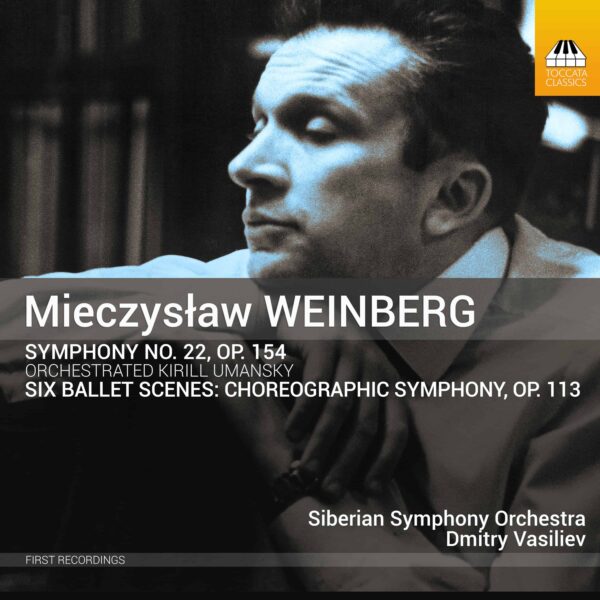
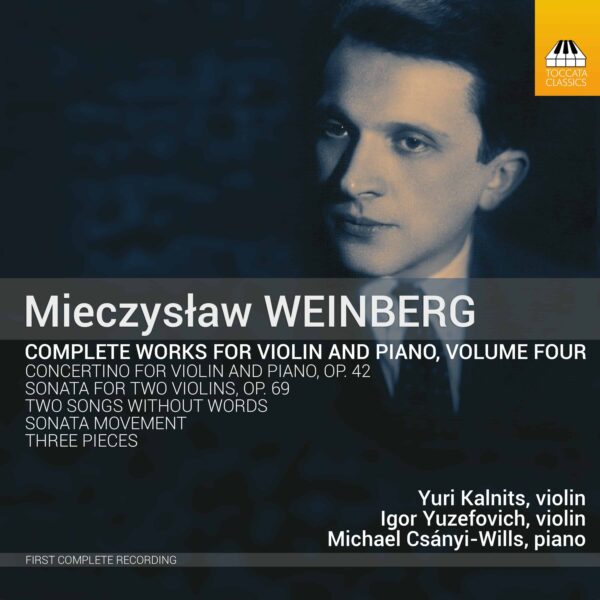
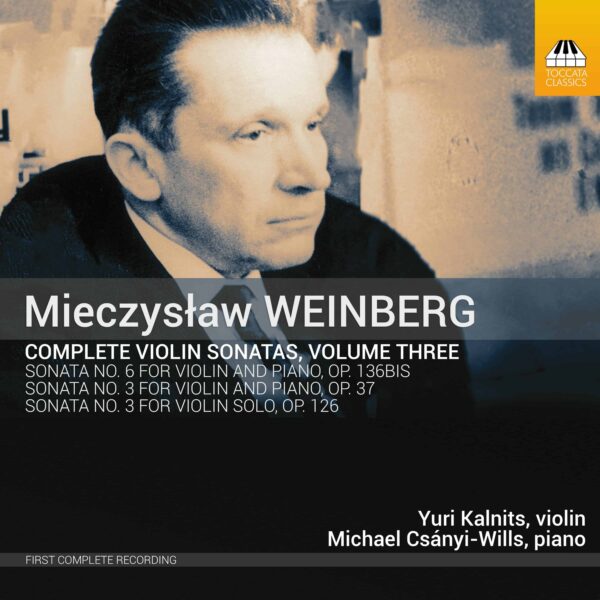
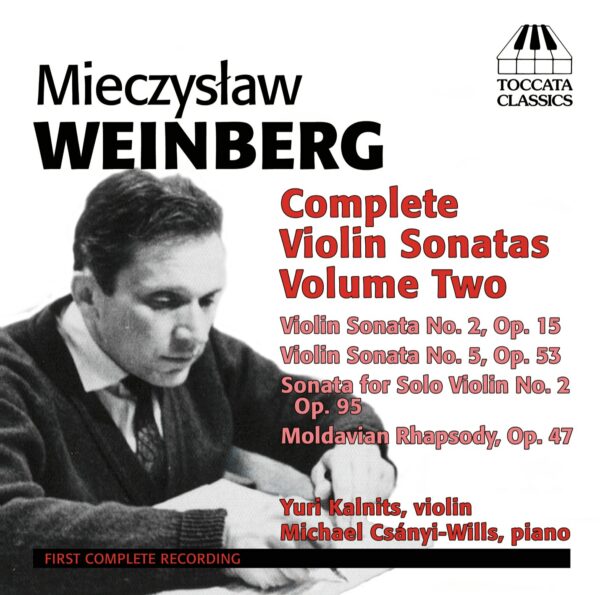
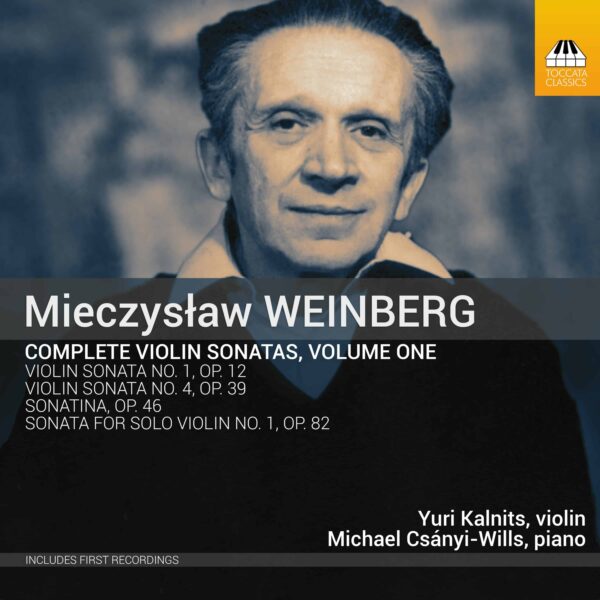
Artistxite :
‘Today, he is one of the most exceptional geniuses of the second generation of Soviet composers, equal to greats like Shostakovitch, Prokofiev and Khachaturian in terms of quality and originality. … The Siberian Symphony Orchestra under Dmitry Vasilyev provides an idiomatic performance for both world first recordings, drawing on their extensive and unmistakable experience with “Soviet music”. They rise admirably to the challenge of the particularly heterogeneous “Choreographic Symphony” with its partially quirky sequences, demonstrating an admirable capacity for change and adaptation. The Siberian Orchestra under Vasilyev shows itself to be a good representative for Weinberg’s consistently gripping (and intense) music… and we look forward to future releases for the series.’
—Salvatore Pichireddu, Artistxite
Music and Vision :
‘Mieczysław Weinberg (1919-1996) was one of the twentieth century’s most prolific composers to come out of Eastern Europe. … This trio of works sees Weinberg writing in a more stylistically daring language, and by the time of his last piece, the 22nd Symphony (also on this recording), the composer was still searching for new pathways to explore. … An invaluable addition to the Weinberg catalogue that is deserving ofserious consideration. Sound and notes are nothing short of absorbing.’
—Gerald Fenech, Music and Vision, March 2016
MusicWeb International :
‘Choreographic Symphony… is a memorable score, full of delicious contrasts, often percussion laden in a similar way to late Shostakovich. … [The Symphony No. 22] steeped in melancholy is notable for its bleak rather severe character and sense of foreboding. … I especially enjoyed its intensity and severe emotions are certainly hard to ignore. … Under the assured baton of Dmitry Vasilyev the Siberian Symphony Orchestra excel with compelling playing of unyielding vitality in the Six Ballet Scenes and vigour matched with sheer concentration in the Symphony. Recorded at Philharmonic Concert Hall, Omsk in Siberia the sound quality is full and clear. The release also has the benefit of a helpful essay in the booklet from leading Weinberg authority David Fanning. …admirably played release…’
—Michael Cookson, Music Web International
Classical Source :
‘The Mieczysław Weinberg discography continues to expand apace with two first recordings from the redoubtable Toccata Classics label, Dmitry Vasilyev and the Siberian Symphony Orchestra making as favourable an impression as on their previous disc of Symphony 21 and the Polish Suite. … What emerged here [Six Ballet Scenes] is a half-hour sequence whose six movements interpolate extracts from the ballet along with new material, the former’s relative accessibility being placed in a frequently acerbic and quirkily orchestrated context. … It makes a viable coupling for Symphony No.22… The present work follows on naturally from the respective ambivalence and anguish of its two predecessors, drawing on No.20’s formal obliquity and No.21’s expressive immediacy in a 40-minute entity that… has a summative quality which Umansky catches unerringly through his idiomatic orchestration: those wary of such realisations can rest assured that this ranks among the most convincing. … It helps that Vasilyev and his players are wholly inside this absorbing piece… An often-impressive work, then, and assuredly no mere adjunct to Weinberg’s output. Fanning and Umansky contribute informative notes – with the latter’s Concerto for Orchestra a piece worthy of Toccata’s attention.’
—Richard Whitehouse, Classical Source
NMZ :
‘In letzter Zeit häufen sich CD-Premieren, Zweit und sogar Dritteinspielungen von Weinbergs Musik auffällig, und zwar keineswegs bloß, weil der 100. Geburtstag im Jahr 2019 allmählich in greifbare Nähe rückt, sondern schlicht, weil sich Qualität am Ende immer durchsetzt’
—Mátyás Kiss, NMZ
Fanfare Magazine :
‘In fact, if you’ve never heard this composer’s music before, you could do much worse than to start with this disc! […]
[Six Ballet Scenes] is a varied and attractive score, and it seems odd that it has been neglected for so long. […]
the Siberian Symphony Orchestra […] plays these two scores with plenty of character. Conductor Vasilyev responds to the wit and daring of the Six Ballet Scenes, and expertly paces and shapes the symphony. […] Recommended.’
—Raymond Tuttle, Fanfare Magazine, June 2016
music-weinberg.net :
‘The music of the symphony was finished but left unorchestrated at Weinberg’s death; Kirill Umansky completed the orchestration after carefully studying a number of Weinberg’s symphonies, and even working in Weinberg’s own villa. Umansky’s concerted efforts were clearly fruitful, since the work sounds completely authentic; and since all the notes are, in the end, Weinberg’s, there is no reason to shy away from this final symphonic masterpiece. The six modernistic ballet scenes are similarly beautiful music with a strong Oriental (Japanese) tinge. The performances of both works by the Siberian Symphony Orchestra, conducted by Dmitry Vasilyev, are exquisite.’
—music-weinberg.net
BBC Music Magazine :
‘It’s difficult to understand how such an accessible and brilliantly scored orchestral work as Weinberg’s Six Ballet Scenes remained unperformed until last year. […] Kirill Umansky has done a sterling job in orchestrating [the Symphony No. 22] somewhat austere work so idiomatically. […] the Siberian Symphony Orchestra under Dmitry Vasilyev performs both pieces with great aplomb.’
—BBC Music Magazine